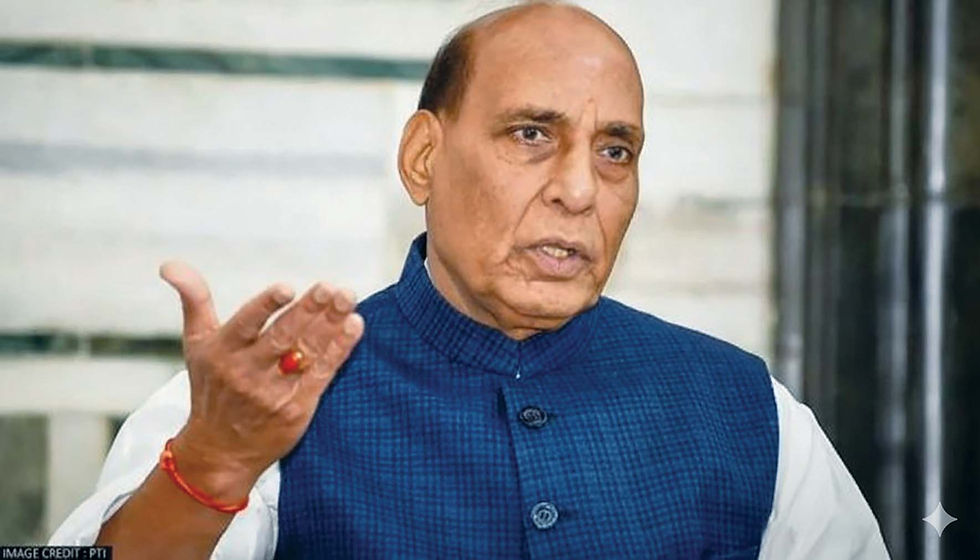Will use full spectrum of power: Pak envoy issues nuclear threat to India
- Correspondent
- May 4
- 3 min read

Amid rising tensions after last month’s deadly terror attack in Pahalgam, Pakistan’s Ambassador to Russia has issued a sharp warning to India, stating that Islamabad would respond with the “full spectrum of power” — including nuclear weapons — if New Delhi carries out any military action.
Speaking to Russian media outlet RT, Ambassador Muhammad Khalid Jamali claimed that "leaked documents" indicated India was planning targeted strikes inside Pakistan. He also warned that a conflict appeared “imminent.”
His comments come at a time when India continues to raise Pakistan’s involvement in cross-border terrorism through diplomatic channels and seeks international backing to hold Islamabad accountable for sheltering terror groups.
"The frenzy media of India and the irresponsible statements coming out from that side has compelled us. There are some other leaked documents whereby it has been decided to strike some areas of Pakistan. So, that makes us to feel that this is going to happen and it's imminent," he said.
"When it comes to India and Pakistan, we don't want to get involved into this debate of numerical strength. We will use the full spectrum of power - both conventional and nuclear," he said.
Jamali emphasized that Pakistan’s military, with the support of its people, would respond with the “full spectrum of power.”
Tensions in Pakistan have remained high over a possible Indian retaliation after Pakistan-backed militants carried out an attack on tourists in Jammu and Kashmir’s Baisaran valley near Pahalgam on April 22.
The threat follows a provocative statement made by Pakistan’s Defence Minister Khawaja Asif during a Geo News interview on Friday. He warned of striking any infrastructure India might build on the Indus River in violation of the treaty. “Certainly, if they attempt to build any kind of structure, we will strike it,” Asif said, also adding that “aggression is not just about firing cannons or bullets — blocking or diverting water is also a form of aggression that could lead to deaths from hunger and thirst.”
On Saturday, Pakistan’s military also conducted a test launch of the Abdali surface-to-surface missile, which can carry both conventional and nuclear warheads and has a range of 450 kilometres. The army stated the launch demonstrated “operational readiness.”
Earlier, Pakistani minister Hanif Abbas had also issued a nuclear threat, saying missiles such as Ghori, Shaheen, and Ghaznavi — along with 130 nuclear warheads — are "kept only for India."
He warned that if India moves to suspend the Indus Waters Treaty and limit Pakistan's water supply, it should prepare for a "full-scale war."
Also on Saturday, Pakistan Prime Minister Shehbaz Sharif said Islamabad had shown a "responsible and measured" response to India following the Pahalgam attack, while denying any Pakistani involvement in the incident that left 26 people dead. Speaking with Turkiye’s Ambassador in Islamabad, Sharif claimed India had provided no evidence and rejected Pakistan’s proposal for an international investigation.
Following the April 22 attack in Pahalgam — which killed at least 26 civilians, including a Nepalese tourist and a local pony guide — India has taken several strong measures after confirming links to Pakistan-based terror outfits.
Citing ongoing "sustained cross-border terrorism," India suspended the Indus Waters Treaty, the 1960 water-sharing agreement with Pakistan. This opens the possibility of restricting or diverting Indus River waters flowing into Pakistan, potentially affecting millions.
India has also revoked all visas issued to Pakistani nationals and ordered those present in the country, including those with medical visas, to leave.
In response, Pakistan threatened to end all bilateral agreements with India, including the Simla Agreement. Diplomatic relations between the two countries have been downgraded, and all backchannel talks have ceased amid worsening ties.
India has further issued a NOTAM (Notice to Airmen), blocking its airspace to all aircraft associated with Pakistan.
Additionally, the Indian government has imposed a total ban on all imports and transit of goods from Pakistan, including those typically allowed. The restriction covers all Pakistani-registered, operated, or leased aircraft — both civilian and military — and will remain in effect until the early morning of May 24, per the current NOTAM.





Comments